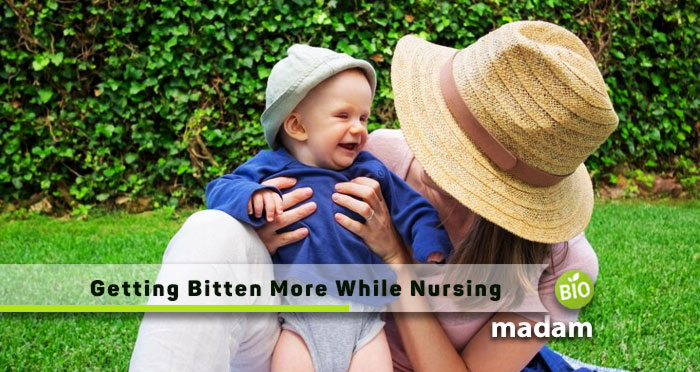Breastfeeding is a beautiful and intimate way to nourish and bond with your baby. However, amidst the joys of this experience, some challenges can arise. One common concern among breastfeeding mothers is the possibility of their baby biting during feeds. In this article, we’ll delve into the reasons behind breastfeeding bites, strategies to prevent them, and how to handle the situation with grace and patience.
Understanding the Act of Breastfeeding
Breastfeeding isn’t just about nourishing your baby; it’s a complex interplay of physical and emotional factors. Understanding this process can help you deal with the biting issue.
The Mechanics of Breastfeeding
When a baby latches onto the breast, they use their tongue and gums to extract milk. Understanding this natural process can help you appreciate your baby’s efforts and frustrations.
Why Do Babies Bite During Breastfeeding?
Babies go through a biting phase during breastfeeding for a variety of reasons. Firstly, teething can be a culprit, with emerging teeth causing discomfort that breastfeeding can temporarily alleviate. Additionally, as babies grow more curious about their surroundings, they may become easily distracted during feeds, occasionally resulting in inadvertent bites. Lastly, babies are natural explorers, often using their mouths to understand the world around them, and sometimes this curiosity extends to the breastfeeding experience itself.
Frequency and Age of Biting
Biting during breastfeeding is a phase that typically begins when babies start teething, which is usually around six months of age. It’s essential to understand that not all babies will bite, and for those who do, it is often an occasional occurrence rather than a constant behavior.
Do You Get Bitten More When Breastfeeding?
The frequency of biting incidents can vary from one baby to another. Some babies may bite more often than others, while some may not bite at all. It largely depends on the individual baby’s teething discomfort and exploration tendencies.
Coping with Biting
Recognizing the signs of an impending bite can help you react quickly and appropriately. Babies may display signs of restlessness, change their latch, or even gaze away from the breast before biting. If a bite does happen, it’s important to remain calm. Gently remove your breast from your baby’s mouth and avoid negative reactions that might startle them.
Strategies to Prevent Biting

- Teething Remedies for Relief: Use teething remedies (teething rings or cold washcloths) to alleviate your baby’s teething discomfort before breastfeeding.
- Create a Calm Feeding Environment: Choose a quiet, comfortable location for nursing to foster a tranquil atmosphere that encourages peaceful feeding.
- Ensure a Proper Latch: Ensure your baby achieves a deep latch, where their mouth covers a significant portion of the areola, not just the nipple.
- Offer Teething Toys for Experimentation: Provide your baby with a teething toy before breastfeeding if they seem to be biting out of curiosity or experimentation. Allowing them to explore the teething toy can satisfy their curiosity and make them less likely to bite during nursing sessions.
Continuing to Breastfeed after Biting
Experiencing biting doesn’t mean you have to stop breastfeeding. If your baby bites frequently, consider adjusting their feeding schedule. Offer solid foods as they reach the appropriate age, which can reduce their reliance on breastfeeding for nutrition.
Maintaining a positive breastfeeding experience involves finding comfortable feeding positions and communicating with your baby during feeds. Engaging with your baby by making eye contact and talking softly can reduce the likelihood of them biting out of distraction.
How Long Does Breastfeeding Biting Last?
The duration of breastfeeding biting varies from baby to baby. Typically, as your baby’s teething discomfort eases and they become more accustomed to feeding, biting incidents tend to decrease. Most babies outgrow the biting phase after a few months, but patience is key.
The Emotional Aspect
Experiencing a biting incident can be emotionally challenging. It’s important to remember that this phase is temporary and doesn’t define your breastfeeding journey. Maintaining a positive outlook and seeking support from fellow mothers or professionals can make the experience more manageable.
Conclusion
Breastfeeding is a remarkable journey filled with love, nourishment, and connection. While the occasional biting incident might disrupt harmony, with understanding, patience, and the right strategies, you can navigate this phase successfully. Remember that this too shall pass, and you’ll soon find yourself cherishing the beautiful moments of breastfeeding once again. Embrace the journey, bumps and all, and relish in the profound bond you share with your precious little one.

People call me Domonique Smith in Ross! I was always fond of helping people, so opted an MBBS degree to pursue my passion as my career. My major interests fall in dealing with pregnant ladies and helping them in the best of my wills for their comfort. I am further planning to choose Gynecology as my major, so wish me luck!

